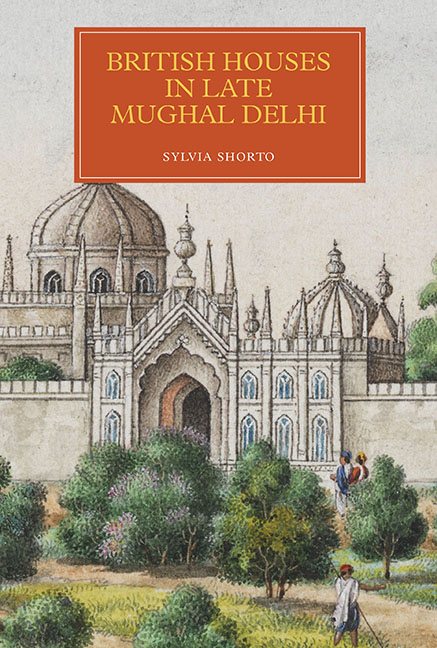Book contents
- Frontmatter
- Dedication
- Contents
- List of Illustrations
- Preface and Acknowledgements
- Abbreviations
- Glossary
- Map
- Chapter 1 Knowledge of Delhi: The Eighteenth Century
- Chapter 2 Hybrid Accommodations: David Ochterlony, the First Residency and the Mubarak Bagh
- Chapter 3 A Lovely Wilderness: Charles Metcalfe and the Garden Houses at Shalimar
- Chapter 4 Truly Fairy Palaces: Robert Smith in Delhi and in Europe
- Chapter 5 The World Displayed: William Fraser and his House on the Hill
- Chapter 6 A Tomb with View: Thomas Theophilus Metcalfe's Dilkusha
- Chapter 7 Dreaming of Home
- Bibliography
- Index
- Miscellaneous Endmatter
Chapter 3 - A Lovely Wilderness: Charles Metcalfe and the Garden Houses at Shalimar
Published online by Cambridge University Press: 07 July 2018
- Frontmatter
- Dedication
- Contents
- List of Illustrations
- Preface and Acknowledgements
- Abbreviations
- Glossary
- Map
- Chapter 1 Knowledge of Delhi: The Eighteenth Century
- Chapter 2 Hybrid Accommodations: David Ochterlony, the First Residency and the Mubarak Bagh
- Chapter 3 A Lovely Wilderness: Charles Metcalfe and the Garden Houses at Shalimar
- Chapter 4 Truly Fairy Palaces: Robert Smith in Delhi and in Europe
- Chapter 5 The World Displayed: William Fraser and his House on the Hill
- Chapter 6 A Tomb with View: Thomas Theophilus Metcalfe's Dilkusha
- Chapter 7 Dreaming of Home
- Bibliography
- Index
- Miscellaneous Endmatter
Summary
‘I feel the want of a country house incessantly,’ wrote a melancholy Charles Theophilus Metcalfe (1785–1846) in a letter to his favourite sister Georgiana in England. ‘As long as I live at the Residency,’ he went on, ‘it will be a public house; and as long as the billiard table stands the Residency will be a tavern.’ The letter was sent shortly before the Christmas of 1824 from the lavish Residency in the princely state of Hyderabad, where Metcalfe had recently been transferred as senior East India Company official. In this and in other rare remaining personal correspondence with Georgiana and his few other intimates Metcalfe lamented the lack of a meaningful family life, which he had consciously sacrificed to the public responsibilities that charted his career. His letters are testimony to the loneliness and sense of alienation that this important public figure always seems to have struggled with in private.
Charles Metcalfe is generally regarded as an exemplary servant of the East India Company at a critical time in its history. The third baronet Metcalfe (later elevated to baron), he, like David Ochterlony, was twice Resident at Delhi. His first term in office was from 1811 until the end of 1818 and his second, shorter stay from 1825 until 1827. Metcalfe's distinguished career as an honest and earnest if moralising public figure was well documented from shortly after his death. His was the kind of life that was a magnet to Victorian biographers. Less has been written about his private life, as there is very little left to narrate it with accuracy. This chapter will attempt to better understand Metcalfe's self-avowed love of privacy and domesticity by looking at his building activities and living arrangements during his two terms in Delhi. The focus will be on reasons for his involvement in the British use of land at the Mughal Shalimar Bagh to the north of Shahjahanabad and on a struggle for the rights to ownership of property there after 1816.
Charles Metcalfe came from a socially assertive family that was already a prosperous one, though not yet as wealthy as it needed to be to fulfil its continuing ambitions (see Table 2).
- Type
- Chapter
- Information
- British Houses in Late Mughal Delhi , pp. 55 - 80Publisher: Boydell & BrewerPrint publication year: 2018

